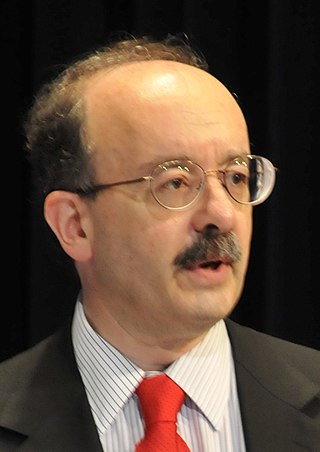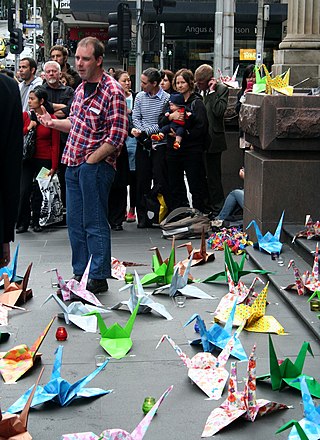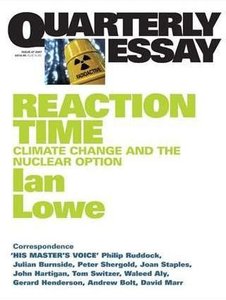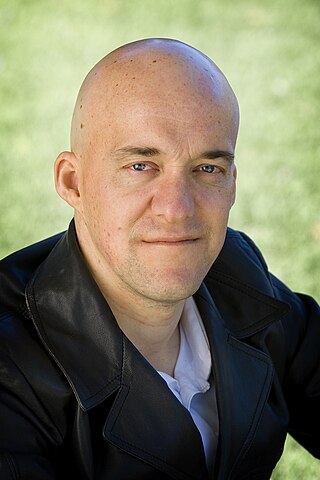
Amory Bloch Lovins is an American writer, physicist, and former chairman/chief scientist of the Rocky Mountain Institute. He has written on energy policy and related areas for four decades, and served on the US National Petroleum Council, an oil industry lobbying group, from 2011 to 2018.
Haydon Manning is an Australian political scientist and Adjunct Professor with the College of Business, Government and Law at The Flinders University of South Australia.

The Eureka Prizes are awarded annually by the Australian Museum, Sydney, to recognise individuals and organizations who have contributed to science and the understanding of science in Australia. They were founded in 1990 following a suggestion by science journalist Robyn Williams.

Mark Diesendorf is an Australian academic and environmentalist, known for his work in sustainable development and renewable energy. He currently researches at the University of New South Wales, Australia. He was formerly professor of environmental science and founding director of the Institute for Sustainable Futures at the University of Technology, Sydney and before that a principal research scientist with CSIRO, where he was involved in early research on integrating wind power into electricity grids. His most recent books are The Path to a Sustainable Civilisation (2023) and Sustainable Energy Solutions for Climate Change (2014).

Jim Green is an anti-nuclear campaigner with Friends of the Earth Australia. Green is a regular media commentator on nuclear issues. He has an honours degree in public health from the University of Wollongong and was awarded a PhD in science and technology studies for his analysis of the Lucas Heights research reactor debates.

Nuclear weapons testing, uranium mining and export, and nuclear power have often been the subject of public debate in Australia, and the anti-nuclear movement in Australia has a long history. Its origins date back to the 1972–1973 debate over French nuclear testing in the Pacific and the 1976–1977 debate about uranium mining in Australia.

Nuclear power in Australia has been a topic of debate since the 1930s. Australia has one nuclear reactor at Lucas Heights, New South Wales, although it is only used to produce radionuclides for nuclear medicine, and does not produce electricity. Australia hosts 33% of the world's proven uranium deposits, and is currently the world's third largest producer of uranium after Kazakhstan and Canada.
Living in the Hothouse: How Global Warming Affects Australia is a 2005 book by Professor Ian Lowe which is a sequel to his Living in the Greenhouse (1989). The book presents a detailed analysis of climate change science and the likely impact of climate change in Australia. Living in the Hothouse also offers a critical overview of the Howard government's policy response to climate change in Australia.

Claudia Kemfert is a German economics expert in the areas of energy research and environmental protection. She is a Professor of Energy Economics and Sustainability at the Hertie School of Governance in Berlin. She heads the Energy, Transportation, and Environment department at the German Institute for Economic Research.

Reaction Time: Climate Change and the Nuclear Option is a book by Professor Ian Lowe which was officially launched by science broadcaster Robyn Williams at the Writers' Festival in Brisbane in September 2007. The book is about energy policy, and Lowe argues that nuclear power does not make sense on any level: economically, environmentally, politically or socially.

Barry William Brook is an Australian scientist. He is an ARC Australian Laureate Professor and Chair of Environmental Sustainability at the University of Tasmania in the Faculty of Science, Engineering & Technology. He was formerly an ARC Future Fellow in the School of Earth and Environmental Sciences at the University of Adelaide, Australia, where he held the Sir Hubert Wilkins Chair of Climate Change from 2007 to 2014. He was also Director of Climate Science at the Environment Institute.
Kim Coral McKay is an Australian environmentalist, author, entrepreneur, and businesswoman. She co-founded the Clean Up Australia campaign in 1989, and the Clean Up the World campaign in 1992, and also co-created The National Geographic Society's The Genographic Project, the world's largest DNA population study.

The Olympic Dam mine is a large poly-metallic underground mine located in South Australia, 550 km (340 mi) NNW of Adelaide. It is the fourth largest copper deposit and the largest known single deposit of uranium in the world. Copper is the largest contributor to total revenue, accounting for approximately 70% of the mine's revenue, with the remaining 25% from uranium, and around 5% from silver and gold. BHP has owned and operated the mine since 2005. The mine was previously owned by Western Mining Corporation. Since the 1970s environmentalists, traditional owners and others have campaigned against the mine, largely on the basis of its contribution to the nuclear cycle and its use of underground water.

Tony Irwin is a nuclear engineer and technical director of Australian company, SMR Nuclear Technology. For three decades he worked commissioning and operating nuclear reactors in the UK for British Energy. He emigrated to Australia in 1999 and took a position with the Australian Nuclear Science and Technology Organisation (ANSTO), where he remained for ten years. Irwin chairs the Nuclear Engineering Panel of Engineers Australia and lectures at the Australian National University and University of Sydney on nuclear science. Irwin has a degree in electrical power engineering.

The Nuclear Fuel Cycle Royal Commission is a Royal Commission into South Australia's future role in the nuclear fuel cycle. It commenced on 19 March 2015 and delivered its final report to the Government of South Australia on 6 May 2016. The Commissioner was former Governor of South Australia, Kevin Scarce, a retired Royal Australian Navy Rear-Admiral and chancellor of the University of Adelaide. The Commission concluded that nuclear power was unlikely to be economically feasible in Australia for the foreseeable future. However, it identified an economic opportunity in the establishment of a deep geological storage facility and the receipt of spent nuclear fuel from prospective international clients.
Nils Göran Arne Roos FTSE is a Swedish academic, technologist, author and businessman. He is a specialist in the field of intellectual capital and an expert in innovation management and strategy. He was appointed Thinker in Residence on industry development by the Government of South Australia in 2011, and subsequently moved to the state's Economic Development Board, where he serves as a member. Amongst a number of other positions, he is also a member of the Flinders University Council. Roos was named one of the 13 most influential thinkers for the 21st century by the Spanish business journal Direccion y Progreso.
Ken Baldwin is professor of physics at the Australian National University (ANU). He is the deputy director of the Research School of Physics and the director of the [http://energy.anu.edu.au/ ANU Energy Change Institute].
Colin Llewellyn Raston is a Professor of Chemistry of Flinders University in Adelaide, South Australia and the Premier's Professorial Fellow in Clean Technology. In 2015, he was awarded an Ig Nobel Prize in "for inventing a chemical recipe to partially un-boil an egg". In 2016, Raston was made an Officer of the Order of Australia for his services to science.
Karen Reynolds is an Australian biomedical engineer. She is currently the Deputy Dean of Computer Science, Engineering and Mathematics at Flinders University and a Matthew Flinders Distinguished Professor. Reynolds is the director of the Medical Device Research Institute and founding director of the Medical Device Partnering Program in South Australia, an organisation that facilitates collaboration between researchers, end-users and industry.

Marcello Costa was an Italian-born Australian medical researcher, academic, and public health advocate. He specialized in the structure and functions of the enteric nervous system. He taught in Turin, Melbourne, and Helsinki before moving to Adelaide in 1975 where he was a foundation lecturer at the Flinders Medical School, building the new discipline of neuroscience at the college. He worked at Flinders University, where he held the title of Matthew Flinders Distinguished Professor of Neurophysiology in the Department of Physiology from 2013 until his retirement in 2021.














